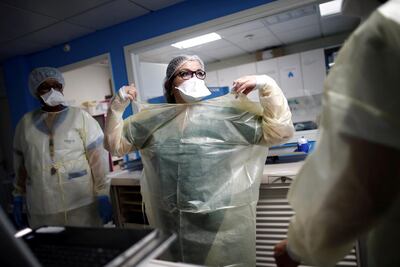The UK might have to introduce more measures to keep the South African variant of coronavirus out as a third wave of infection grips Europe, a senior government adviser said on Friday.
Epidemiologist Prof Neil Ferguson, from Imperial College London, said the surge in cases in France was worrying given that up to 10 per cent of positive tests were identified as the South African variant.
That variant has previously been detected in the UK, but measures such as surge testing and the international travel ban have been able to stop it spreading.
The warning comes after French President Emmanuel Macron was forced to put Paris and parts of the north into a month-long lockdown to contain the spread.
Scientists said the South African strain could be more resistant to current vaccines.
A study in the New England Journal of Medicine on Monday found the AstraZeneca-Oxford vaccine may be only 10 per cent effective against the South African variant in preventing mild to moderate disease.
Prof Ferguson, a member of the UK government's Covid-19 modelling group, said there are "important decisions coming up" to prevent the variant spreading across the UK.
"When infection levels go up in France, 30,000 cases a day, that implies there are at least 1,500 to 2,000 cases a day of the South African variant there," he told BBC's Radio 4 Today programme on Friday.
“That is the variant we really do want to keep out of the UK – we won’t be able to keep it out for ever but the longer we can keep it out and keep it at low levels in the UK, the more time we have to vaccinate the population and update vaccines to cope.”
Prof Ferguson said it would be impractical to add France to the UK's red list travel ban countries because of reliance on essential trade.
“I think there are important decisions coming up and it’s always a balancing act,” he said.
“We need a bespoke agreement [with France] that mitigates the risk. That risk will increase over time. As we relax measures, there becomes more opportunity for these strains to grow and cause a problem.”
France reported 35,000 new cases on Thursday and there were more Covid-19 patients in intensive care in Paris than during the peak of the second wave.
Prime Minister Jean Castex said the "epidemic is getting worse", with the fast-spreading UK strain accounting for about 75 per cent of cases.
A lockdown will begin from Friday at midnight in France's 16 hardest-hit regions that, with the exception of one on the Mediterranean, form a corridor from the northern Channel port city of Calais to the capital.
Barbers, clothing and furniture shops will have to close, but bookstores and others selling essential goods can stay open.
Schools will remain open and people will be allowed to exercise outdoors within a 10-kilometre radius of their homes.
Travel out of the worst-hit areas will not be permitted without a compelling reason.
Prof Ferguson said the distribution of vaccines should help France to contain the worst of the UK variant, which was first identified in south-east England in November, before Britain’s vaccine drive began.
“I think most of those European countries won’t see the same peak we saw in January this year but they are nevertheless in a difficult situation right now,” he said.













